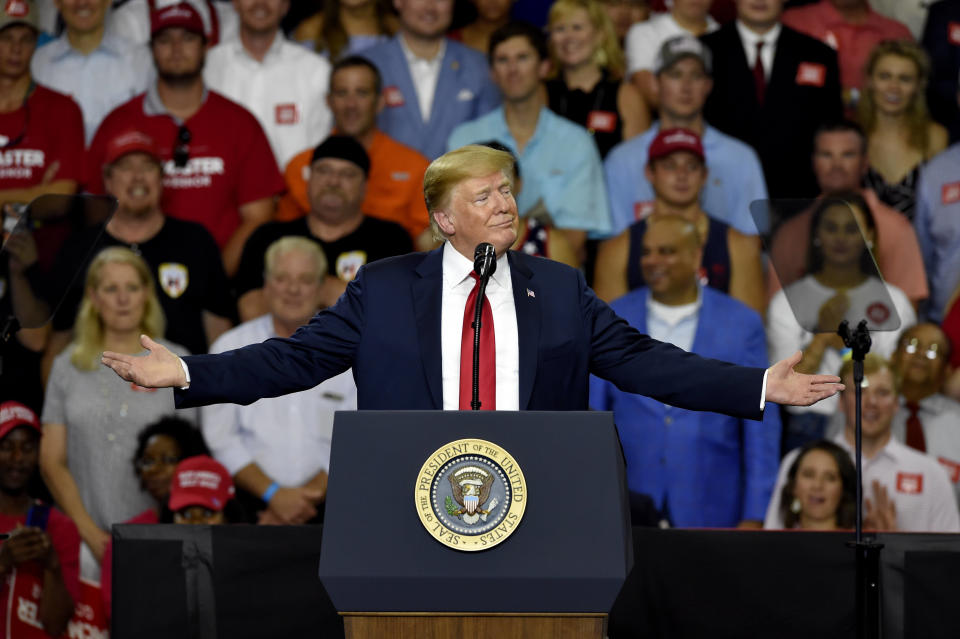Trump's rage towards Harley-Davidson is what happens when you pick winners and losers
President Donald Trump is not happy with Harley-Davidson (HOG).
In a series of tweets Tuesday morning, Trump railed against the company’s announcement that it would shift the production of some motorcycles away from the U.S. in order to avoid paying tariffs on exports to the EU.
“A Harley-Davidson should never be built in another country-never!” Trump said.
“Their employees and customers are already very angry at them. If they move, watch, it will be the beginning of the end – they surrendered, they quit! The Aura will be gone and they will be taxed like never before!”
A Harley-Davidson should never be built in another country-never! Their employees and customers are already very angry at them. If they move, watch, it will be the beginning of the end – they surrendered, they quit! The Aura will be gone and they will be taxed like never before!
— Donald J. Trump (@realDonaldTrump) June 26, 2018
In Trump’s view, his relationship with Harley-Davidson — company executives visited the White House in February 2017 — ensured the company would play ball with the administration’s economic agenda. Shifting production overseas while explicitly citing tariffs as the impetus for the shift is not something that covers Trump’s tariffs in glory.
In a separate tweet earlier Tuesday, Trump said Harley-Davidson’s announcement on Monday was simply the company using tariffs as an excuse for its already-planned shift of some production from Kansas City to Thailand.
And to some extent this is certainly true.

As we noted on Monday, Harley-Davidson’s announcement was but the latest in what’s been a series of moves for the company to downsize its U.S. manufacturing presence and move its workforce overseas in recent years.
The company’s framing of its decision making on Monday suggested that tariffs only accelerated trends predominating in its business. Namely, that its best prospects for additional growth lie outside the United States.
The trouble with winners and losers
But Trump’s rage at Harley-Davidson and his displeasure with a company’s announcement that it would do what it thinks is best to maximize profits amid a shifting trade landscape shows the political danger of picking economic winners and losers.
As my colleague Rick Newman has written previously, from the outset Trump’s actions on trade this year have implicitly chosen which industries and companies would be winners and which would be losers. Tariffs on the import of steel and aluminum were positives for shares of U.S.-based steel producers. The basket of losers was essentially everything else, including consumers likely faced with higher prices.
Harley-Davidson’s move to shift production of EU-bound motorcycles overseas was the company choosing not to shift higher costs onto consumers, but instead re-configure their own strategy to avoid eating the costs of new tariffs. The net loser still remains the U.S. workers who will no longer be employed and the U.S. economy as a whole. Harley-Davidson and its EU consumers, however, are still winners.
In an email on Tuesday morning, UBS economist Paul Donovan noted that taxing the trade of goods — which is what recent tariffs from the White House and the EU do — worked in the past. Things like motorcycles, for example, may have only been made in one place and any barriers to moving them across borders would simply be part of the necessary, immutable cost of that business. In today’s global business world, that is not the case.
“Twenty-first century trade is a lot more complex,” Donovan writes, “it is estimated that 40% of global trade is within companies. Companies can shift production.”
“Harley Davidson’s decision to move production out of the US is logical,” Donovan adds.
“If bikes are made in the US, EU taxes on trade hurt the US economy, Harley Davidson profits, and possibly the EU consumer. If bikes are made elsewhere, EU taxes on trade hurt the US economy but do not hurt Harley Davidson profits or the EU consumer.”
And so in this modern economic reality of corporate decisions happening on the background of a global customer, production, and profit base, taxing goods only incentivizes companies to build them somewhere else.
Forcing companies, like Trump, to pick their own winners and losers.
—
Myles Udland is a writer at Yahoo Finance. Follow him on Twitter @MylesUdland


